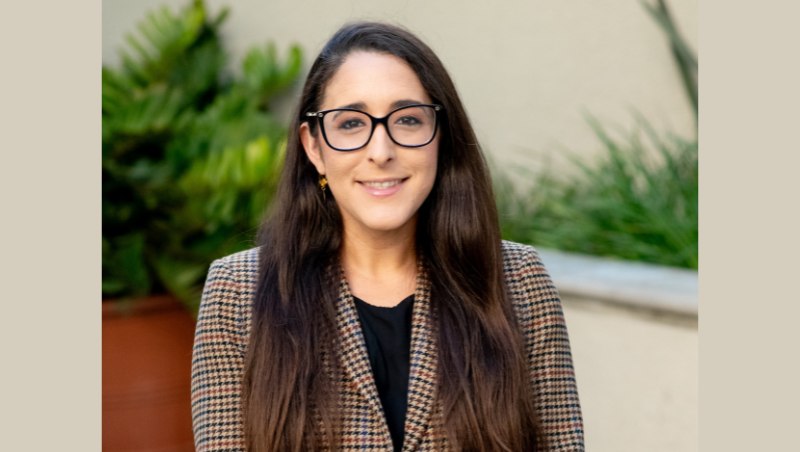
Faculty Spotlight: Professor Emily Behzadi Cárdenas

When we last profiled Professor Emily Behzadi Cárdenas, she was already making waves in the world of art and cultural heritage law. Now, she’s channeling years of research, cross-cultural insight, and a passion for justice into her first book—Heritage Bound: Law, Legacy, and Landscape in Mexico—a project she describes as both “deeply rewarding and humbling.”
“I’ve spent years researching cultural heritage law,” she says, “but pulling all of my research into a cohesive narrative—especially for a book—has pushed me to think differently. I am now focused on structure, audience, and storytelling.” What began as a scholarly endeavor has become far more personal. “The more I wrote, the more I found myself weaving in stories, historical moments, and ethical dilemmas that shaped my own thinking.”
One chapter in particular is sure to spike curiosity. “Distilling the Law of Tequila” explores how legal frameworks—like appellations of origin and cultural heritage protections—shape who can produce and profit from Mexico’s most iconic spirit. “It looks at how big multinational corporations (mostly non-Mexican) are cashing in on tequila while eroding the very important cultural aspects behind it,” she explains. “It’s about how the law sometimes helps protect tradition—but simultaneously can help outsiders exploit it.”
Professor Behzadi Cárdenas also continues to expand her work on the relationship between cultural preservation, climate change, and social justice. After Hurricane Maria, “Puerto Rico saw the destruction of historic buildings and cultural landmarks, many of which had no formal protection under U.S. preservation laws,” she says. “These communities frequently lack the political and financial capital to fight for important resources. As a result, cultural traditions and spaces are at risk, while the island continues to be developed by those outside the community.”
This intersectional lens has taken Professor Behzadi Cárdenas across the globe. Over the past few years, she’s presented research in Australia, Wales, and Scotland—experiences that have reshaped her sense of the field. “I used to think cultural heritage law was a pretty niche corner of academia. But presenting around the world has shown me just how universal these conversations are — and how deeply they connect to issues of colonialism and identity.” The most moving parts of these trips, she says, have been meeting local artisans, like Indigenous weavers in Oaxaca and Bogotá, who remind her that these issues are anything but theoretical. “These are not just legal issues on paper. They affect real people.”
Back on campus, Behzadi Cárdenas has continued teaching Property and Community Property courses, adapting her approach to meet students where they are. “This year, I’ve been trying as many practice problems as possible to allow my students to understand the material and ready themselves for the bar exam.” Of course, she continues to make it relatable: “My examples always include references to my favorite movies, shows (Gilmore Girls and Parks and Rec), and, yes—Benito (Bad Bunny).”
Students regularly praise Professor Behzadi Cárdenas for her accessibility and care. In a moment of societal flux, she sees the classroom as a space for both rigor and refuge. “I try to create space in the classroom for tough conversations. I also try to remind students that their voices and experiences are valuable,” she says. “I want them to feel supported, seen, and empowered to use their legal education for justice and change.”
That commitment extends beyond the classroom as well. As faculty advisor for the San Diego La Raza Lawyers Association, Behzadi Cárdenas is deeply invested in mentorship. “As a Latina professor, it’s incredibly important to me to be present and available for my Latino students,” she says. “I know how powerful it can be to see someone who shares your background in a position of leadership, and I take that responsibility seriously. I love seeing my students thrive—not just in the classroom, but in the community, at networking events, and as they build their careers.”
Professor Behzadi Cárdenas has received recognition across the academy for her contributions in the classroom and beyond. She was recently honored with the Society of American Law Teachers (SALT) Junior Faculty Award, which recognizes a teacher who demonstrates a commitment to justice, equality and academic excellence. She also holds leadership roles in several national organizations, including the American Society of International Law and the Association of American Law Schools.
And when she’s not writing, teaching, or advocating? “The Fourth Wing series is currently my obsession,” she laughs. “I’m also listening to Bad Bunny’s DeBÍ TiRAR MáS FOTos on repeat.” And she takes full advantage of Coronado’s dog beach, unplugging from the legal world with her pups, and recharging for the next chapter.
About California Western School of Law
For 100 years, California Western School of Law (CWSL) has trained practice-ready
lawyers and thoughtful advocates for justice. As the first and longest-running law
school in San Diego, CWSL remains committed to providing students with the fundamental
knowledge, skills, and real-world experience to thrive in a rapidly evolving legal
landscape. CWSL enrolls a student body representative of our diverse society, amplifying
access to opportunities for social and economic mobility. Tailored programming allows
students to focus on specific areas of interest, and distinguished faculty are dedicated
to student growth and scholarship on critical social issues. The law school emphasizes
practical, hands-on training through clinics, internships, externships, and pro bono
service. CWSL is committed to excellence in education, nurturing compassionate legal
professionals who use the law effectively and creatively to solve complex human and
societal problems. For more information, visit www.CWSL.edu.
